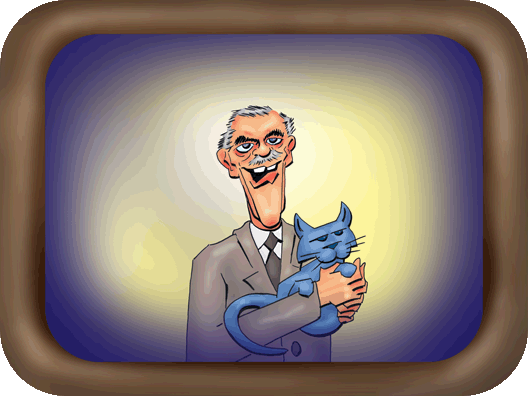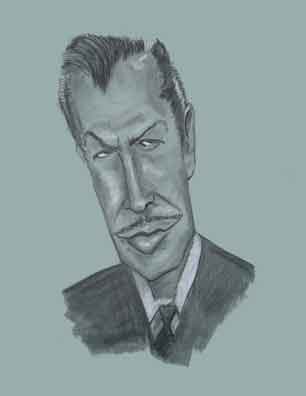Boris Karloff
aka William Henry Pratt

Boris Karloff
The Grandfatherly Type
"Boris Karloff" was not a stage name picked when William Henry Pratt starred in Frankenstein in 1931. He selected the name when he began acting after he immigrated to Canada from his native England. That was in 1909.
In any case, Boris wasn't one of the stars of the film. At least not at first. The opening credits don't even mention him by name. He was fourth down the list and the monster was simply cast as "?".
Boris's anonymity quickly vanished. The monster was such a sympathetic character - he's not a bad guy at all - and Boris did such a creditable job of acting, that the next year he was picked to play Imhotep - the Mummy - in, yes, The Mummy. Here Boris got top billing with his name appearing even before the title of the movie. Then when the Bride of Frankenstein was released in 1935, the credits also started off with Boris's name before - and in bigger letters than - the title.
From then on, Boris was King of Horror Movies. After 1935 he was in over 70 pictures and almost always as one of the bad guys. Even when he was a good guy at heart - such as in Frankenstein 1970 - he was a bad guy. All in all Boris was in over 160 movies.
Boris also continued his stage work. Most famously, he was in the first Broadway production of Arsenic and Old Lace in 1941. He recreated the role for television in 1962 (a production which also starred Tony Randall). Boris played Jonathan Brewster, the mean and murderous brother of the two nice and murderous old ladies. At one point one of the characters points to Jonathan and says "He looks like Boris Karloff".
Boris became known to the baby boomers when he appeared as host (the "presenter" as the Brits say) of the television show Thriller in 1960. He introduced each show and also acted in some of them. Because of the limited special effects available at the time, the shows had to rely on excellent cinematography, well-crafted plots, and good acting.
Thriller was an "anthology" series - that is, the cast of each show changed - and many of the actors later became famous and even iconic. Of course, they didn't play the same characters we grew to know and love. For instance, in "The Grim Reaper" William Shatner - brave, decisive, and idealistic Captain Kirk - played a particularly money-grubbing, despicable, and murderous nephew of Natalie ("Mrs. Howard Thurston") Schafer. Viewers were glad to see him get his just desserts.
Like many actors then and now, Boris had worked at a variety of jobs between landing roles in pictures and plays. But after he was featured in the Criminal Code - like Frankenstein, released in 1931 - he became a full time actor. That year was a busy one for Boris. He not only played in Frankenstein and the Criminal Code, but also in fourteen other movies.
William Henry Pratt was born in London in 1887. He was not from an acting family but from a diplomatic family. Both his father, Edward, and older brother, John, were in the British Foreign Service, and John received a knighthood in 1929. Although Boris spent much of his early and middle adult years living in Canada and the United States, he remained - as did Charlie Chaplin (later Sir Charles) - an English citizen.
Naturally as busy a schedule as Boris had required often onerous travel as he would commute back and forth from his homes in London and Hollywood. An actor's life is never easy on the family. Boris was married five times (although some sources list six). His only child - a daughter, Sara - was born to his penultimate wife, Dorothy.
Boris kept acting in movies and on television through the 1950's and 60's. He is well remembered along with Vincent Price and Peter Lorre for playing in the adaptations - often very loose - of Edgar Allen Poe stories. However, the three men only appeared together in one Poe movie - The Raven. This 1963 film was a comedy and about a loose as a loose adaptation can be. The three men also starred in The Comedy of Terrors along with Basil Rathbone and also on the self-satirizing "Lizard's Leg and Owlet's Wing" episode of Route 66.

Vincent Price
One of Boris's most remembered performances wasn't on stage or screen per se, but when in 1966 he supplied the narration and the voice for How the Grinch Stole Christmas. It remains one of his most popular shows and a lot of the younger audience are not aware of Boris's horror legacy.
Boris never thought the proper term for his movies was "horror". Horror, he thought, implied something disgusting. His movies were not disgusting. They were scary. So a better word was "terror".
Of course, by the 1960's Boris was not a young man, and the filmmakers had to make allowances for Boris's increasing frailty. Director Roger Corman remembered it was very iffy as Boris negotiated the stairs in his first scene of The Raven and throughout most of the film Boris was sitting. In "The Night of the Golden Cobra", one of the less stellar and more campy episodes of the Wild Wild West, Boris's performance is also mostly delivered while seated in a chair. When he walked he did so with difficulty and when he was knocked to the ground toward the end of the show, the scene clearly employs a stunt double.
Most of Boris's last films were produced by the first serious independent film company, American International Pictures. The films were often shot in the space of a few days (two weeks was a long shoot for AIP) and so they were able to hire veteran actors like Vincent, Peter, and Boris at low overall cost but a decent rate of pay. For the Raven Boris was paid $30,000 for a three week schedule - very long for AIP - but he also got a percentage. In some films, Boris's roles were cameos and took little time from his television and radio work. And in one case Boris only had to devote two days to a film in which he had top billing.
Boris's fame got continual shots in the arms from articles in Famous Monsters of Filmland, a popular magazine founded by James Warren and Forrest J. Ackerman in 1958. The issues had articles that covered many of the old horror movies even before the advent of sound. It was Famous Monsters of Filmland that revived the reputation of Lon Chaney, Sr., even though most of the readers had never seen any of his movies which were all silent.
Naturally we saw hefty doses of Boris. Because the kids of the time had few opportunities to see his older films - this was long before home video - Famous Monsters would usually provide a synopses which were illustrated with still photographs.
What shocks! shocks! modern readers is that in the early issues of Famous Monsters you can actually read the articles without having to hunt for the story amidst a patchwork plastering of ads. That's because in early magazines ads were secondary to subscription and newsstand purchases in generating revenue. Today about 2/3 of an article's microscopically printed page is commercially occupied, but in Famous Monsters you actually had the articles and ads on separate pages. So we're not surprised that Famous Monsters lasted a quarter of a century.
Some of Boris's later films will raise eyebrows. Was he really in such straitened circumstances that he had to appear in Bikini Beach and The Ghost in the Invisible Bikini? Or show up in drag as Mother Muffin in the Girl From Uncle "Mother Muffin Affair"? Certainly not. Boris liked to act and he had a sense of humor.
Like many of his generation, Boris was a smoker and in his old age he developed emphysema. He made his last films in 1968 and died the following year in London.
References
Dear Boris: The Life of William Henry Pratt, a.k.a. Boris Karloff, Cynthia Lindsay, Knopf, 1975.
Boris Karloff: A Gentleman's Life, Scott Nollen, Midnight Marquee, 2005.
"Boris Karloff", Encyclopedia Britannica, 2016.
How I Made A Hundred Movies in Hollywood and Never Lost a Dime, Roger Corman, Delta, 1991.
"Commentary for The Raven, Roger Corman, MGM, 2005 (The Raven, American International Pictures, 1963).
Lancashire and Whitehall: The Diary of Sir Raymond Streat, Volume 1, 1931 - 1939, Maurgerite Dupree (Editor), Manchester University Press, 1987.
"The Night of the Golden Cobra", Wild Wild West, Season 2. Robert Conrad, Ross Martin, Boris Karloff, Audrey Dalton, and Simon Scott. Director: Irving Moore; Writer: Henry Sharp (CBS). Air Date: September 23, 1966. A very strange and nearly plotless episode where Boris plays "Mr. Singh" a wealthy Sikh who is in cahoots with Indian (i. e., Native American) Commissioner Colonel Stanton Mayo to rob the Pawnee Indians of Oklahoma of their rightful interest in a vast underground sea of oil. Naturally, Jim and Artie thwart these evil plans.
The episode is set in "Greater Oklahoma" an entity which never existed. What became Oklahoma was first called Indian Territory, and Indian Territory itself was later divided into a smaller Indian Territory and Oklahoma Territory in 1890. These two territories were re-combined into Oklahoma when it was admitted to the Union as a state in 1907.
From the lay of the land around Mr. Singh's castle, we surmise they are in the eastern part of the modern state. The land that was allocated to the Pawnees, though, is in the north central region and isn't quite as hilly or timbered as in the show. Of course, the episode was actually filmed in California.
An interesting bit of trivia is that Audrey Dalton, the actress who plays Veda, Mr. Singh's daughter and Jim's love interest, was the real life daughter of General Emmett Dalton of the Irish Free State Army. It was Emmett who in 1922 was sitting in the car next to Irish military leader Michael Collins when they were ambushed at Beal na mBlath (pronounced "Bail-na-Blah") in County Cork by members of the Irish Republican Army. Michael, as all students of Irish history know, was killed although Emmett and all other members of the convoy - as well as the IRA members - survived.